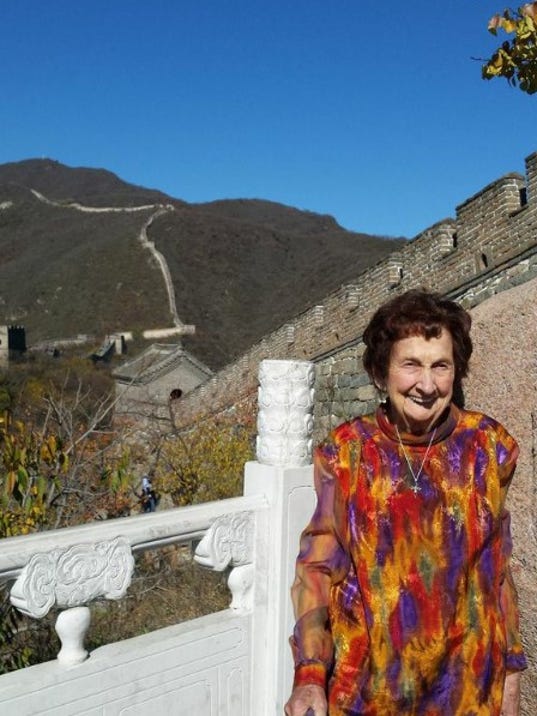流浪者說
流浪世界,感悟人生
From USA TODAY.
Maude Pettus was the head nurse at a hospital in China during World War II when a Japanese soldier demanded to enter the care facility.
It was not uncommon for Japanese soldiers to raid Chinese hospitals during their occupation in the 1940s — and Pettus was well aware of this. But instead of allowing the soldier to explore the facility on his own, Pettus took him to her office.
She gave him tea and cookies.
“I took him to the private rooms to see the ill patients in beds so he could see the devastation of the bombing,” Pettus, now 101 years old, told USA TODAY. “He asked were these injuries due to the bombing, and he understood very well.”
The soldier left — taking nothing, and not entering the operating room. “It was nice to see him go,” she said.
Pettus traveled to China during World War II to work as the head nurse at the Hsiang-Ya (Xiangya) Hospital in Changsha, the capital of Hunan Province, where she aided wounded Chinese from 1940-1945 during the devastating war with Japan.
Now, 70 years later, Pettus fondly recalls her time in China, from saving lives at the hospital to inviting new friends and visitors over for tea on a regular basis. She said the Chinese people received her with warmth and respect. And the feelings were mutual.
“The calmness of their spirit impressed me so much, and I think it changed me to be calm myself and have some of this calm spirit that the Chinese had,” she said. “They’re wonderful people.”
On Sept. 3, celebrations across China will commemorate the 70th anniversary of the end of the war, and Pettus has returned for the historic event. The celebration is the first of its kind in China, and workers will have three days off to relax and celebrate.
Meifang Zhang, deputy consul general of the Chinese Consulate General in New York, told USA TODAY the celebration will allow the Chinese people to pay tribute to those who lost their lives during the war – and remember the importance of peace.
"(The Chinese victory is) a brilliant example for the weak to triumph against the strong, and also encourage the oppressed to find their confidence and show bravery in their struggle against aggression in their fight for their liberation," Zhang said.
During WWII, Japanese imperial forces controlled much of China and committed war crimes and brutal acts against the Chinese, including a mass killing spree in Nanking, China, known as “the Rape of Nanking.” The U.S. Congress gave $500 million to China at the time, and President Roosevelt described the U.S. as China’s greatest ally.
During the eight-year-long war between Japan and China, which began in 1937, 15 million to 20 million Chinese were killed, and 80 million became refugees.
Pettus didn’t go to China alone. She traveled with her husband, Winston Pettus, whom she met after she graduated from Capital City School of Nursing in Washington, D.C., in 1936. Winston Pettus had an opportunity to work at the Xiangya Hospital. When he told his wife the news, she did not just agree — she urged them to go. Since the age of four, she knew she wanted to go to China.
The couple moved to Changsha to work at the hospital, which is part of the Yale-China Association, a non-profit organization dedicated to connecting American and Chinese people. While there, Winston Pettus worked as a doctor and his wife as the head nurse.
Pettus’ memories of her time in China are largely pleasant — though memories of her patients who suffered from the devastation of war often stay with her.
For Pettus, one patient stands out the most. Despite undergoing multiple surgeries that resulted in the loss of his legs and arms, the man expressed only gratitude to Pettus and the other nurses.
“The next morning in rounds, we saw that he was so animated and delightful, and we hardly understood,” Pettus recalled. “He said, ‘You saved my eyes. That’s what I use for a living.’”
But, while treating others, tragedy struck. Winston Pettus learned to fly an I-5 military plane to deliver supplies to different areas in need in China. On one of his missions, his plane crashed in a mountainous area above Guizhou Province and he was killed. After just five years of marriage, the dream was suddenly over.
“We had a wonderful relationship,” Pettus said, fondly. “We picked flowers every Sunday.”
After her husband's death, Pettus returned to the U.S.. But China has always stayed in her heart. Her current visit to China is her second over the past year. At the age of 101, her memories and love for the country are strong and enduring.
What she learned most from her century spent on Earth — and from the Chinese people — is present in each of her experiences she sustained while there: “A positive attitude toward life,” she says.




